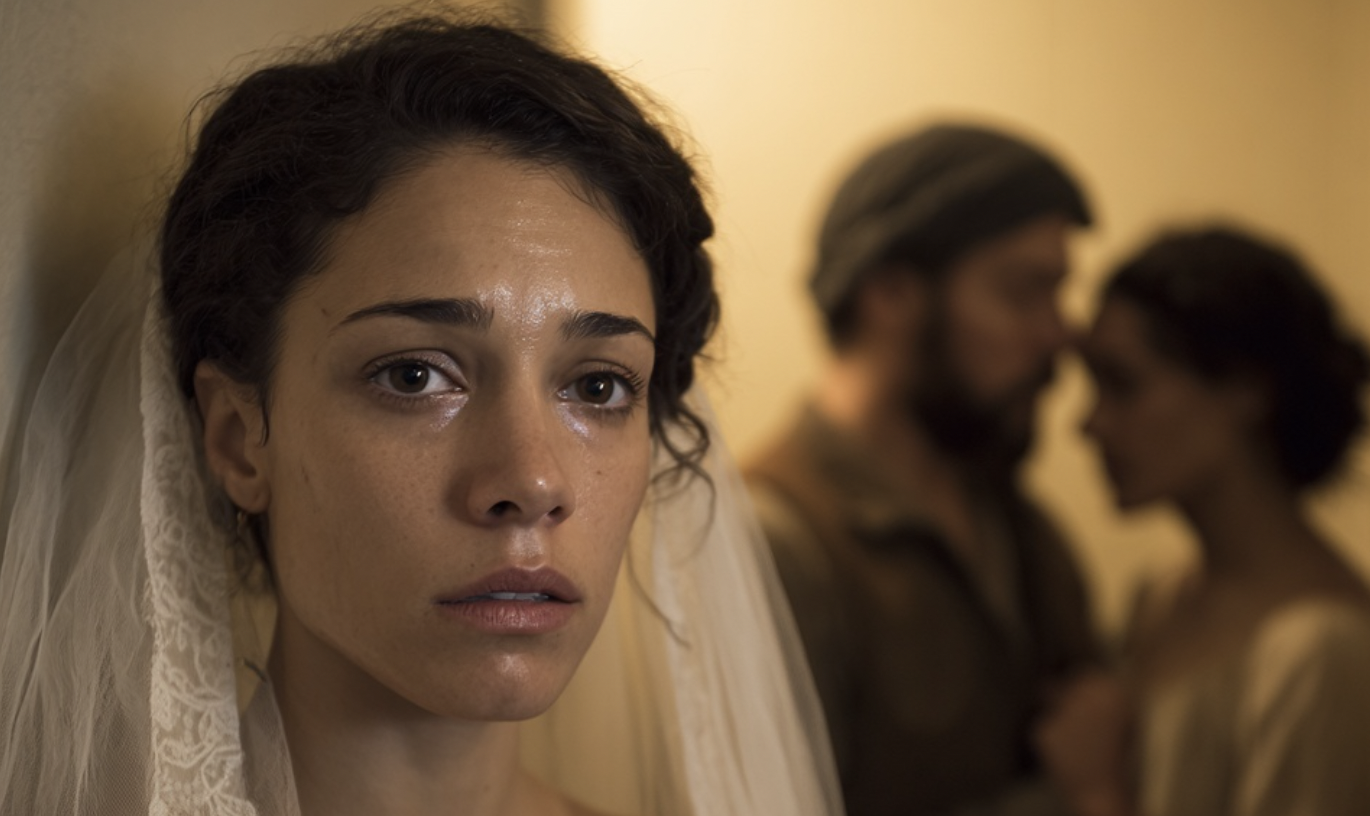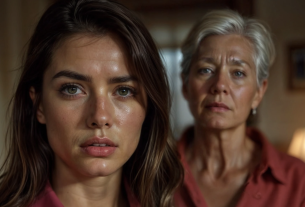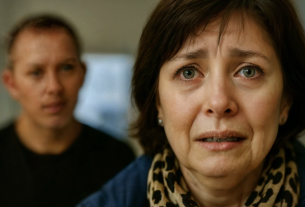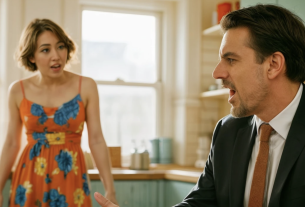Music thundered, drowning out the clink of glasses and the cheerful buzz of voices. A hundred guests raised toasts to the happiness of the newlyweds, not suspecting that one of them had already trampled that happiness. Sophia, in a billowing white dress like a cloud, was running herself ragged looking for her brand-new husband.
Valery had disappeared half an hour ago, and a faint unease was turning into a bad premonition. She checked the smoking area, peeked into the lobby, and only then was she drawn to a shabby door with a sign that read “Staff Only.” Muffled giggles came from behind it.
Sophia pushed the door open. In the dim light of a single bulb, among mops and buckets, she saw him. Valery was pinning her best friend and maid of honor, Liliya, to the wall. His hands roamed over her champagne-colored satin dress, and his lips were buried in her neck.
Noticing Sophia, Valery jerked back as if scalded. A whole gamut of emotions crossed his face: from drunken stupor to blind panic.
“Sona… Baby, it’s not what you think!” he babbled, stepping toward her and straightening his tie that had slid askew. “We… we were just fooling around! Lila was joking that her dress was uncomfortable, and I… I was helping. It’s just a joke, I swear!”
His words, steeped in the smell of expensive cognac, sounded pathetic and absurd. He tried to grab her hand, but Sophia yanked it away as if from red-hot metal.
Liliya, unlike him, didn’t show a trace of embarrassment. She calmly adjusted her hair and measured Sophia with a cold, appraising look.
“Oh, come on, Sophia, don’t play the tragic heroine,” she said with a cynical smirk. “So what. Men are men. Valery loves you; he just needs to unwind sometimes. That stamp in the passport doesn’t mean anything. You’d better get used to it if you want to keep your marriage.”
Revulsion rose in Sophia’s throat in a thick, nauseating wave. She looked at the man to whom a few hours earlier she had sworn eternal love, and at the woman she had considered a sister. In an instant they became strangers, repulsive to her.
“Our marriage?” she repeated in an icy voice. “There is no marriage. It’s over before it even began. I’m filing for annulment.”
“What? Sonia, come to your senses! The guests, our parents, the money!” Valery wailed, his face contorting in horror at the thought of a public scandal.
But Sophia wasn’t listening anymore. She turned and, gathering the skirts of her ridiculous, now hateful dress, rushed out. Past the stunned guests, past the laden tables, past the entire fake fairy tale she had built so carefully. She ran out of the restaurant into the cold night, with only one aim—to get as far as possible from this betrayal, this filth, this shattered dream.
The night city received the lonely bride with indifference. The cold wind tugged at her veil, and her expensive shoes tapped against the dirty asphalt. Each step echoed with pain not in her feet but in her heart. Everything had collapsed. Not just the wedding, not just the relationship—the dream of her whole life had fallen apart, the foundation on which she had planned to build her future.
The dream of a family. Of her own, a real family—something she had never had. She had been left as a baby at the door of an orphanage, wrapped in an old blanket. She remembered neither a mother’s tenderness nor a father’s hands. Her whole life had passed under an institutional roof.
Among the other children she was always different. When everyone cried from hurt or loneliness, Sophia clenched her fists and stubbornly kept silent. When others gave up, she pushed through, driven by a single, all-consuming goal. She was determined and headstrong, but her ambitions were unlike those of her peers.
She didn’t dream of becoming an actress or an astronaut. Her deepest, most cherished dream was to create her own family. On walks she could spend hours watching couples with children go by. She saw a father toss a laughing daughter into the air, a mother gently straighten a boy’s hat, and imagined that one day it would be the same for her. That simple human happiness seemed the highest reward, access to which had to be earned.
So she sank her teeth into her studies, graduated school with a gold medal, and entered university to study economics. She worked from her first year, grabbing any opportunity to save money, to become independent, to be a “worthy” bride for an equally worthy man.
She deliberately put off her personal life, believing that first she needed to get firmly on her feet, build a career, buy an apartment. She had calculated everything. Every step of her life was part of a grand plan leading to the main goal—creating the perfect family.
And then, at twenty-eight, when she had her own apartment, a good job, and a stable income, she met Valery. Handsome, ambitious, from a good family—he seemed the perfect candidate. The embodiment of her dream. And for the first time in her life her iron calculation, her flawless intuition that had never failed her in business, made a fatal, catastrophic mistake. She trusted the wrong person, and now the carefully built world at her feet lay in ruins.
Without knowing how, Sophia made it to the city park. Sinking onto a cold wooden bench under the dim light of a streetlamp, she finally allowed herself to catch her breath. The few passersby shied away from the sight— a bride in a wedding dress, sitting alone in the park at night, looked like a ghost or a character from a grim fairy tale.
Sophia paid them no mind. Inside her there was a ringing emptiness, a scorched desert where only a few hours ago gardens of hope had bloomed. She mechanically smoothed the folds of her soiled skirt and only then noticed something foreign on the bench beside her. An old, scuffed smartphone in a silly children’s case with glitter and a unicorn. Someone had dropped it.
Moved by a kind of automatic impulse, she picked up the phone. She needed to find the owner. She pressed the power button, and the screen lit up. There was no password. Sophia meant to open the contacts, but her finger slipped and tapped the gallery icon.
The first thing she saw was a charming selfie. A girl of about seven stared at her from the screen, mischievous eyes and a wide, toothless grin—one of the top front teeth was missing. The picture was so vivid and spontaneous that a faint smile touched Sophia’s lips of its own accord.
She began to scroll. There were many photos. The same girl—on a carousel, with an ice cream, on the couch at home. In almost all the shots, next to her was a man, obviously her father. He looked tired, but he gazed at his daughter with boundless tenderness. Something in those photos made Sophia uneasy. She looked closer and realized: in all the pictures where they were together, the man was either sitting or lying down. In none of them was he standing.
She scrolled to the end of the gallery and came across the last video. Tapping “play,” Sophia saw the same girl sitting in a dim room. Her face was lit only by the multicolored lights of a Christmas garland. She looked straight into the camera, big tears rolling down her cheeks.
“Dear Father Frost,” she whispered in a trembling voice, “please don’t give me any gifts this year. No dolls, no candy. I don’t need anything. Please help my dad… Make it so he can walk again.”
Sophia froze. She, who since childhood had learned to suppress any emotions, who hadn’t cried even now, on the night of her worst disaster, felt hot, unfamiliar tears welling in her eyes. The pain of a small, unknown girl pierced her icy armor. In the scorched soul a tiny but strong sprout appeared—not of self-pity, but of an irresistible desire to help.
The thought of her own grief receded into the background. Now a new, clear purpose drove Sophia—to find this girl. Over and over she scrolled through the photos on the phone, trying to find at least some clue. In several shots, in the background, you could see the old railway station building and the square in front of it. That was enough to determine the approximate area.
Sophia hailed a taxi. She no longer thought about her ridiculous outfit, or how she looked from the outside. She was going to a child she didn’t know. On the way she asked the driver to stop at an all-night grocery store. There, under the astonished gaze of the cashier, a bride in a dirty dress bought the biggest cake, a box of chocolates, and several bags of sweets for kids.
“Miss, are you alright? Did you run away from your wedding?” the saleswoman, an elderly woman with kind eyes, finally couldn’t help asking.
Sophia silently showed her the photo of the girl on the phone screen.
“I’m looking for her. She lost her phone. You wouldn’t happen to know her?”
The saleswoman peered at the picture first with suspicion, then with growing sympathy.
“Oh, that’s Katyusha! Of course I know her! She and her dad come here often. Poor things… He’s in a wheelchair after an accident. Good people, just beaten down by life.”
The woman wrote down the exact address on a scrap of paper and handed it to Sophia.
Ten minutes later Sophia stood at a shabby door on the third floor of an old five-story building. Her heart pounded with nerves. What would she say? How would they take her? A woman in a wedding dress with a cake in the middle of the night—at the very least it looked strange.
She took a deep breath and hesitantly pressed the doorbell. There was some shuffling behind the door, the sound of a child’s feet, and then the lock clicked. The door flew open, and there she was. The very girl from the photo, Katya, in star-patterned pajamas. Seeing Sophia in all her bridal splendor, the girl froze for a second, then her eyes widened in delight.
“Daddy! Daddy, come here, quick!” she shouted, turning back into the apartment. “There’s a real bride! A real one!”
A man rolled from the room into the hallway in a wheelchair. It was the same father from the photos, only in person he looked even more tired and stern. His gaze slid over Sophia, the cake in her hands, and puzzlement crossed his face. He clearly decided that the “bride” was part of some silly game or prank cooked up by his irrepressible daughter.
“Katya, what’s going on here?”
But Sophia, having found her voice, held the phone out to him.
“Hello. I think your daughter lost this.”
Later, over tea in the tiny kitchen, after the initial shock had passed, a blushing Katya—without taking her dazzled eyes off Sophia—explained everything. It turned out that this evening she had argued with her dad. She had made a wish that if they saw a real bride before midnight, it would be a sign from above. A sign that miracles really do happen and her dad would definitely get better.
Two days passed. Sophia returned to her empty, cold apartment, but her thoughts were far away. The images of Katya and her father, Mikhail, wouldn’t leave her head. She replayed their meeting again and again: the wonder in the girl’s eyes, the weary guardedness in her father’s, and that inexplicable, almost mystical role she had happened to play in their lives.
She felt a strange, irrational pull toward these complete strangers, as if their chance encounter had tied them with an invisible thread. Her own tragedy had faded, replaced by a new, unfamiliar feeling of shared involvement in someone else’s misfortune, which for some reason felt like her own.
In the evening, coming back from work, she ran into a ghost from her past life at her building entrance. Valery. Sober, angry, hollow-cheeked. He blocked her way.
“Sophia, can we talk? Enough of this circus! You disgraced me, my parents, yourself! Come home, we’ll fix everything, forget this idiotic incident.”
His words no longer caused pain. Only a cold, detached irritation.
“There’s nothing to fix between us, Valery,” she replied calmly, looking him straight in the eye. “I already told you. Yesterday I filed for an annulment. We’re done. Goodbye.”
She walked around him and entered the building without looking back. That conversation put the final point on it. It convinced her completely that she was on the only right path. The past had to be burned to ashes so that something new could grow on the scorched ground. The next day after work, Sophia didn’t go to the grocery store but to a big children’s shop. She wandered between the shelves, buying everything she thought might delight a little girl: a huge doll, educational games, craft kits, and a whole stack of colorful books.
With two large bags she stood once more at the familiar door. This time Mikhail met her even more guardedly.
“Why are you doing this?” he asked quietly, letting her into the apartment. “Katya talks about you and nothing else now. You’ve become some kind of fairy to her. Don’t give her false hope.”
“These are just gifts for a good girl,” Sophia smiled. “And about hope… Sometimes it’s the only thing we have. Listen, the weather is so nice. Why don’t we all go for a walk in the park?”
Mikhail frowned, ready to refuse. He hated going out, feeling the curious, sometimes pitying looks of passersby. But then Katya burst out of the room, having heard the magic word “walk.”
“Daddy, please! With the bride! To the park! Please!”
The combined pressure of Katya, beaming with happiness, and Sophia, calm and confident, broke his resistance. With a heavy sigh, he nodded.
They walked in the very park where Sophia had sat on the night of her failed wedding. But now everything was different. Sunlight played in the leaves, Katya chattered nonstop, showing Sophia every interesting pinecone and every pretty flower, and Sophia listened with genuine interest and laughed. Mikhail silently rolled his chair alongside, but his scowl gradually melted.
He watched them, and a warm, barely noticeable smile hovered on his lips. For the first time in many months after the accident he felt not despair, but something like peace. And Sophia… For the first time in her conscious life, Sophia felt absolutely in the right place. Beside these two, in this odd, hastily assembled little company, she felt more warmth and authenticity than in all her years with Valery.
The idyll was rudely shattered. From around a bend in the path, staggering, came Valery. He was drunk and clearly looking for a confrontation. Seeing Sophia laughing beside a man in a wheelchair, he bared his teeth.
“So that’s where you are!” he bellowed across the park, drawing the attention of bystanders. “Found yourself a consolation prize? Traded me, a normal man, for some cripple?!”
Sophia’s face changed in an instant. Without hesitation she stepped forward, placing herself between Valery and the wheelchair, shielding Mikhail with her body. But she didn’t have time to speak. Little Katya, sensing the threat, darted out in front of Sophia and, thrusting out her tiny fists, glared fiercely at the drunken man.
“Don’t you dare hurt our bride!” she squeaked.
The scene only egged Valery on.
“Get your snot-nosed brat out of here!” he barked and roughly shoved Katya aside. The girl stumbled and fell onto the grass.
The next second Sophia, blind with rage, shoved Valery hard in the chest.
“Don’t touch her, you bastard!”
He staggered but kept his feet. Fury twisted his features. He seized Sophia’s arm, squeezing her wrist painfully.
“You’ll pay for this, you—”
And then the impossible happened. Mikhail’s face turned into a mask of pain and fury; he let out a low, guttural growl. With an inhuman, superhuman effort, bracing his hands on the armrests, he began to rise. The muscles in his legs, long atrophied and lifeless, tensed to the limit. He stood. Unsteadily, swaying, but he stood on his own feet. And before Valery could grasp what was happening, a powerful, precise punch sent him sprawling onto the ground.
Silence fell. Valery groaned, lying on the grass. Mikhail collapsed beside him; his strength had left him again.
Sophia and the passersby stood frozen in shock. Only Katya, looking at her father—who was breathing hard but still standing—whispered through tears:
“I told you… I told you that miracles happen.”
The way home was quiet, but it was a silence not of awkwardness—of something completely different. It was thick, ringing, saturated with astonishment, hope, and that deep bond that is born only in the moment of a shared miracle. Mikhail sank back into his chair with difficulty, but now it was merely a means of getting around, not a sentence. The air was filled with the sense of a tremendous turning point after which nothing would be the same.
Six months passed. Those half-dozen months turned into a marathon of struggle and hope. Inspired by that day in the park, pushed along by Sophia’s faith and Katya’s boundless love, Mikhail began his road to recovery. They were days and nights of grueling exercises, pain, setbacks, and small victories. He worked with a rehabilitation therapist whom Sophia found and paid for; he spent hours at the parallel bars, step by step relearning how to command his body.
And Sophia and Katya were his main support, his personal cheer squad. They celebrated every success, wiped away tears after failures, and never let him give up. One evening, when he, without assistance, managed to walk from one wall of the room to the other, he stopped in front of Sophia, took her hands in his, and looked into her eyes.
“Sophia, marry me. For real. But I have one condition: we’ll only go to the registry office when I can stand next to you on my own two feet, with no support.”
In that moment Sophia looked at him and understood she was a completely different person. The calculating, closed-off woman afraid of her feelings was gone. In her place was the new Sophia—the one who could laugh sincerely at Katya’s jokes, cry with happiness at her beloved’s progress, and no longer fear feeling.
She let go of her perfect plans and found something far more precious—love that was real, alive, imperfect, but absolutely true. She found what she had sought all her life, but discovered where she had never expected.
Their wedding took place a year after they met. It was a modest ceremony with just the closest people. There was no lavish dress, no hundreds of guests, no expensive restaurant. There was only a quiet room at the registry office, Katya’s happy laughter as she tossed rose petals, and Mikhail, standing firmly on his own two feet beside her, holding her hand. He kept his word.
On a quiet family evening, when Katya was already asleep, they sat in the kitchen—the very one where once a “real bride” and a gloomy man in a wheelchair had drunk tea. Mikhail put his arm around Sophia’s shoulders and asked softly, gazing at her with endless tenderness:
“What did I do to deserve such happiness, Sona?”
She nestled against him and smiled with her new, open smile.
“Silly. It’s not just you. We both got lucky. Lucky that we were lost and found each other.”
In that moment she knew for sure: her dream had come true. She had found her family. Not an ideal one, not built according to plan, but a real one. And in it, she was finally home.



